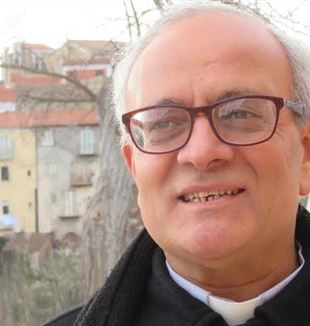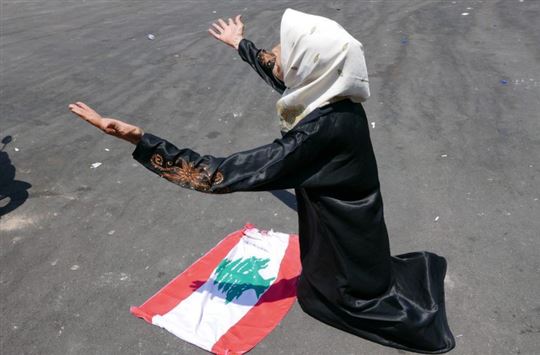
Lebanon: “Among refugees to make room for miracles"
Fr. Abdo Raad works in Lebanese refugee camps. Not out of welfarism, he says, but out of love: “The paths of history remain open, one can still hope.”Fr. Abdo Raad, a Lebanese Melkite Greek-Catholic priest, is one of the very few religious people to have ever set foot in the Sabra and Shatila Palestinian refugee camp in Beirut. The place's name recalls one of the cruellest massacres of the war that tore the Cedar country apart between 1975 and 1990, and it is still a symbol of a conflict that has never been resolved and that is often rekindled. Generations of Palestinians live inside the camp, who grew up dreaming of a faraway homeland, but also of criminals, terrorists and traffickers of all sorts. Among the tunnels and precarious houses piled on top of each other, anger and frustration have grown over the decades. These are feelings shared, for different reasons, also by the Lebanese – now in the grip of hunger because of a political and economic crisis that seems to have no solution – and by the millions of refugees, mostly Syrians and Iraqis, who have poured into Lebanon over the past decade to escape war or Isis. “The situation in my country is unbearable,” Fr. Abdo explains, “Both for my people, who are struggling to make ends meet and have not overcome the religious and factional conflicts that have always inhabited it; and for the refugees who do not see their rights recognized and literally live by the day. In the face of all this, as a priest and as a man, I ask myself: can we still hope for salvation? Of course we can. The paths of history remain open. Let us continue to seize the time and opportunities to work for the good of the most vulnerable. It is true that there will always be many unanswered questions, but it is also true that there is always room for miracles – Christ is risen!”
The association called Annas Linas (for each other) was born out of this certainty, he recounts. It is made up of Christians, Druze and Muslims, and over the years it has begun to support three refugee camps and a school for refugee children, as well as providing assistance to the neediest families with medicine, clothes and food kits and by organizing training courses or recreational-cultural activities for the youngest. This is nothing compared to the aid put in place by large international organizations, most recently the European Union, which has allocated a billion-euro aid package for Lebanon over four years. But numbers are not enough to reflect the value of an association. “I would never have done anything alone,” Fr. Abdo clarifies, “The suffering I see has always questioned me, just as the wicked geo-political and geo-religious logics that split humanity in half have always questioned me. We are all created by one God who loves everyone, but we forget that. In Lebanon we have long been welcoming millions of Palestinian refugees, Iraqis and Syrians, Christians and Muslims… all citizens of Heaven. We started from here: every person is unique and every life is worth living.”
Much of what he recounts is also influenced by his personal story. He was a child when the war knocked at his home in the Lebanese Shuf, and he was forced to flee from the bombs and leave everything behind. The first time the conflict was resolved quickly; it was the 1970s, and Christians in the area were massacred in a horrific reprisal that lasted less than a lightning flash. The second time, however, was devastating: “I was a teenager, my father was a farmer, we were a simple family. There was a massacre in our village, we lost everything: friends, family, home. When we managed to return, 15 years later, there was nothing left. We had kept a small flame of faith, though, like a presentiment that we could rebuild despite everything. And so we did. My decision to become a priest matured during those years.”
Today Annas Linas works in refugee camps, mostly inhabited by Muslims, but also in the Dbaje camp, where there are mostly Christians. There, Fr. Abdo explains, a small church was set up on the initiative of the Palestinian Christian refugees. “I think it is the neatest, cleanest and most beautiful camp in the whole Middle East. Because Christianity brings a culture of undeniable beauty, visible to anyone.”
In other places, however, it is resentment that speaks, or the bitterness over a dream to return home, which is unlikely to come true. “New generations of Palestinian Muslims, who have known nothing other but the reality of the camps, grow up with a distorted ideal of homeland and are often instrumentalized by armed movements or groups. They dream of Palestine, ignoring or pretending to ignore that it is certainly not paradise. And in doing so they idealize it, grow up with the myth of returning and hatred for the land that hosts them. So much anger in so many young people I meet there. But I keep going, because if we do little economically, we can still offer friendship and try to be together in the face of life's questions: what can I call home? What is my homeland? What am I doing in the world?”
These are the questions that the young refugees ask themselves, as well as the elderly. Like Aida (not her real name) who is 70 years old and has never left the camp since she was six. “Her family is Sunni; she left Palestine as a child. She got married in Sabra and Shatila in a haphazardly mended tent, then over time built herself a small house, but never really wanted to put down roots in this land where she feels like a foreigner.” When she meets Fr. Abdo she always repeats the same refrain: there is no hope. There is no future for her, for her five children, for her grandchildren. He politely disagrees, and he always turns up at their next meeting to keep her company. And the time after that, and so on. “This is what I mean when I say that one must first of all offer friendship, an outstretched hand, a chance to pacify wounds as old as the world. I do not believe in welfare, I believe in the goodness of human relationships.”
Today it is Syrians who are in need: more than a million of them – although there has been no official data since 2019 – have migrated to Lebanon because of the war. The Lebanese state does not officially recognize the dozens of refugee camps that have sprung up in the eleven years of the Syrian conflict; it does not have the means to support them. So thousands of Syrian civilians today live scattered around the country without integrating into the socio-economic system: they cannot work, they cannot study, they cannot buy houses. They live in limbo.
“Since we cannot help them all, we chose to focus on children and young people. We want to show them that they can be loved even by foreigners, that there is some beauty. So an informal school, called the ‘charity school,’ was set up in recent years to allow refugee children to study and follow the Lebanese school program. At the end of the courses, students can access exams in the public school and thus obtain a valid degree. There is no tuition to pay, the teachers are volunteers who have decided to offer their time for free for these people, and today the institute has 240 students.” But, he concludes, over time an unexpected thing has happened: “Many Lebanese families, who perhaps before turned up their noses at seeing refugees – who are often looked down upon because they receive economic aid in dollars from the United Nations, at a time in history when the Lebanese lira is not worth anything– have asked to be able to enrol their children at the school as well. And so, day after day, at the desks and in the classroom, dialogues arise between the children and then between their parents. A continuous dialogue,
we get to know and recognize each other.”
Read also - "Love given for the sake of love"
Another concern of Fr. Abdo is that of unrecognized minors: children born in refugee camps, often from secret relationships, since most refugees are women with children who fled Syria while their husbands stayed behind to fight. There are so many of these children, who often have no last name, no date of birth, no identity: “It is for them that I feel the greatest pain. How can you grow up without knowing who you are? Without knowing who your parents really are and where your origins are? In my mind, I often go back to my childhood, when I thought I could defend my home with a rifle good only for shooting birds. Instead, what sustained my existence was faith in Christ, the only one who never allowed me to be alone. The only one who will be able to take care of everyone we meet with our association much better than we could. But we are glad that we can be, with all of our limits, a part of His presence in the world.”